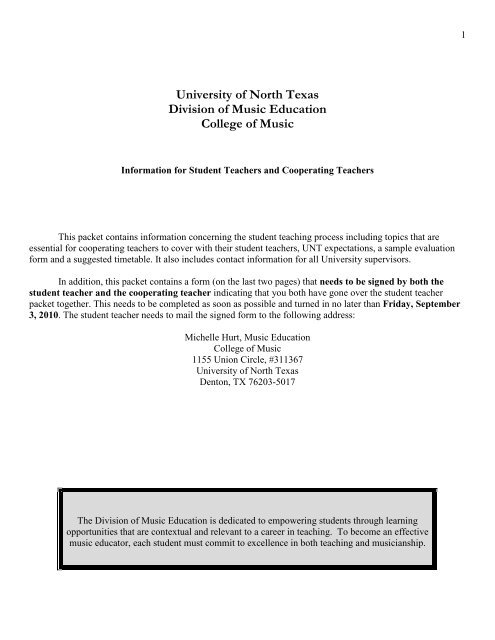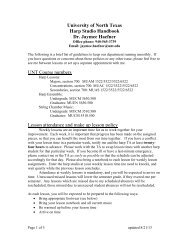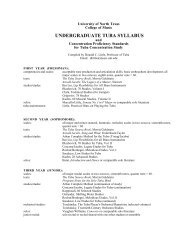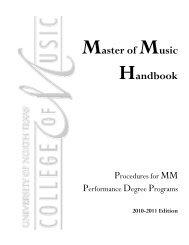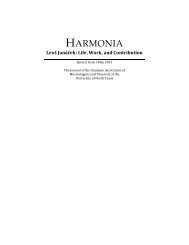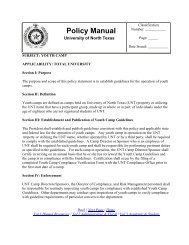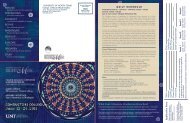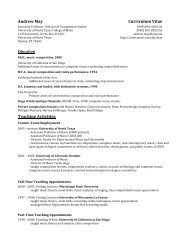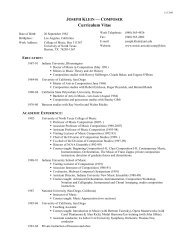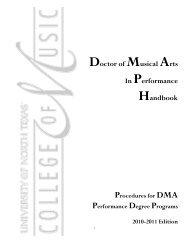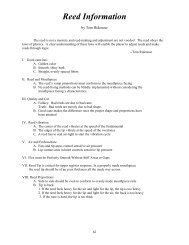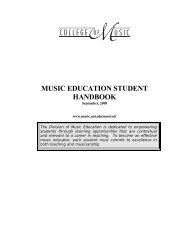University of North Texas - UNT College of Music - University of ...
University of North Texas - UNT College of Music - University of ...
University of North Texas - UNT College of Music - University of ...
You also want an ePaper? Increase the reach of your titles
YUMPU automatically turns print PDFs into web optimized ePapers that Google loves.
<strong>University</strong> <strong>of</strong> <strong>North</strong> <strong>Texas</strong><br />
Division <strong>of</strong> <strong>Music</strong> Education<br />
<strong>College</strong> <strong>of</strong> <strong>Music</strong><br />
Information for Student Teachers and Cooperating Teachers<br />
This packet contains information concerning the student teaching process including topics that are<br />
essential for cooperating teachers to cover with their student teachers, <strong>UNT</strong> expectations, a sample evaluation<br />
form and a suggested timetable. It also includes contact information for all <strong>University</strong> supervisors.<br />
In addition, this packet contains a form (on the last two pages) that needs to be signed by both the<br />
student teacher and the cooperating teacher indicating that you both have gone over the student teacher<br />
packet together. This needs to be completed as soon as possible and turned in no later than Friday, September<br />
3, 2010. The student teacher needs to mail the signed form to the following address:<br />
Michelle Hurt, <strong>Music</strong> Education<br />
<strong>College</strong> <strong>of</strong> <strong>Music</strong><br />
1155 Union Circle, #311367<br />
<strong>University</strong> <strong>of</strong> <strong>North</strong> <strong>Texas</strong><br />
Denton, TX 76203-5017<br />
The Division <strong>of</strong> <strong>Music</strong> Education is dedicated to empowering students through learning<br />
opportunities that are contextual and relevant to a career in teaching. To become an effective<br />
music educator, each student must commit to excellence in both teaching and musicianship.<br />
1
Contact Information for <strong>University</strong> Supervisors, Observers, and Administrators<br />
Instrumental (Band) Administrative Assistant for Student Teaching<br />
Dr. Darhyl Ramsey Mrs. Michelle Hurt<br />
Darhyl.Ramsey@unt.edu Michelle.Hurt@unt.edu<br />
Office: 940-565-3749 Office: 940-565-4090<br />
Fax: 940-565-2002<br />
Dr. Nathan Kruse<br />
Nathan.Kruse@unt.edu Chair <strong>of</strong> Division <strong>of</strong> <strong>Music</strong> Education<br />
Office: 940-565-3713<br />
Dr. Debbie Rohwer<br />
Mr. Danny Prado Debbie.Rohwer@unt.edu<br />
dtprado@verizon.net Office: 940-369-7538<br />
817-247-8742<br />
Mr. Brad Barnes<br />
bradbarnes@me.com<br />
Instrumental (Orchestra) Choral<br />
Elementary<br />
Mr. Karrell Johnson Dr. Alan McClung<br />
Karrell.Johnson@unt.edu Alan.McClung@unt.edu<br />
Office: 940-369-7539 Office: 940-369-7936; Home: 940-381-6623<br />
Dr. Don Taylor<br />
Don.Taylor@unt.edu<br />
Office: 940-565-3745<br />
Mrs. Susan O’Rear<br />
sorear@dentonisd.org<br />
Office: 940-369-2800<br />
2
Planning<br />
Essential Topics<br />
Student teachers are just beginning to discover the importance <strong>of</strong> planning lessons and rehearsals. It is<br />
vital that they experience a formal planning process. Here are some suggestions:<br />
• Share with the student teacher your year-long curriculum at all grade levels. Show them the goals<br />
and objectives you have for each group.<br />
• Share how daily lessons and rehearsals fit into your long-range goals.<br />
• Show them a written plan for a lesson or rehearsal that they can use as a model for their own<br />
sessions. Share with them that an instrumental or choral rehearsal segment comes out <strong>of</strong> score analysis<br />
and is proactive. Reading through a score and reacting to what the ensemble does is important, but not a<br />
part <strong>of</strong> formal planning.<br />
• As they begin to plan their own lesson and rehearsal segments, plan collaboratively with them.<br />
• Be sure the student is informed in plenty <strong>of</strong> time for their teaching sessions so they will have<br />
adequate time to plan and your assessment can be fair. You should review their plan AT LEAST ONE<br />
DAY BEFORE they use the plan so that you might make suggestions for improvement.<br />
Feedback<br />
It is crucial that these beginning teachers receive plenty <strong>of</strong> input from you. They rely on your expertise<br />
for guidance and reassurance. Feedback is likely the most important element <strong>of</strong> what you do as a cooperating<br />
teacher.<br />
• Set aside a regularly scheduled time DAILY to discuss what the student has observed and what he<br />
or she has taught.<br />
• A portion <strong>of</strong> your feedback should be verbal and a portion should be written.<br />
• Be sure to take notes as you observe them.<br />
• Videotape their teaching segments and watch portions <strong>of</strong> the tape with them, commenting on their<br />
actions. Include positive comments as well as those for improvement.<br />
• Be very specific in your feedback. “That was a really great job” doesn’t tell the student what they did<br />
that was great, or how to improve.<br />
• Always start your feedback with a positive comment.<br />
• Assist them in coming up with solutions for problems that you notice.<br />
Evaluation<br />
There are formal evaluations required by <strong>UNT</strong>. The first evaluation will be due Monday, February 21,<br />
2011 and a final evaluation will be due on Monday, May 2, 2011. These forms will be sent to you via e-mail.<br />
Please complete and return via e-mail attachment. The next two pages is a sample evaluation form.<br />
3
<strong>University</strong> <strong>of</strong> <strong>North</strong> <strong>Texas</strong><br />
Cooperating Teacher Midterm Evaluation <strong>of</strong> Intern (Sample Form)<br />
Please complete the following information:<br />
Student Teacher: ___________________________________<br />
Cooperating Teacher: ___________________________<br />
Semester/Year: _____________________ Grade/Subject: _________________<br />
School: _________________________ School District: ________________________<br />
Student Teacher Performance Rating<br />
Please check the appropriate ratings category:<br />
Clearly<br />
Outstanding<br />
Exceeds<br />
Expectations<br />
Meets<br />
Expectations<br />
Student Participation in Learning XX<br />
Learner-Centered Instruction XX<br />
Evaluation/Feedback on Student Progress XX<br />
Classroom Management XX<br />
Pr<strong>of</strong>essional Communication XX<br />
Narrative Evaluation:<br />
Below<br />
Expectations<br />
Unsatisfactory<br />
This student teacher is doing a wonderful job in many ways. There are areas that we continue to work<br />
on for improvement, but overall, he is making good progress.<br />
As I work with him on planning his student teaching segments, he is understanding more the importance<br />
<strong>of</strong> sequencing instruction for individual lessons. His written plans have become more detailed and useful. He is<br />
understanding how planning for individual rehearsal sessions contributes to long term goals. He is able to<br />
prepare goals and objectives for individual lessons, but is still continuing to work to devise a variety <strong>of</strong> teaching<br />
strategies to obtain those objectives. He is almost always prepared for his teaching segments and has gotten<br />
better about making sure that all the materials and equipment he needs are readily available for the lesson.<br />
He is communicating with the students well. They almost always understand his directions. We are<br />
working on a better balance between verbal and nonverbal communication. He still wants to “speak” all his<br />
4
Narrative Evaluation Continued:<br />
directions instead <strong>of</strong> modeling for them. He is getting better at being adaptable and being able to think on his<br />
feet. He demonstrates this by being able to deviate from his plan when he perceives that the students are having<br />
difficulty.<br />
We are working on improving his pacing, as he is still allowing too much “down” time, especially in<br />
transition from one activity to the next.<br />
His musical skills as excellent. We are working at making his conducting gestures more expressive, and<br />
he needs to become more comfortable modeling for the students during rehearsals.<br />
His classroom management skills need considerable improvement, but this is pretty typical <strong>of</strong> students at<br />
this phase. He is beginning to develop a “teacher” voice and is working hard to be observant at all times. He<br />
does start his teaching on time and gets the students involved quickly, but has some problems in pacing that<br />
result in students talking. We are also working hard at his giving specific feedback to the students. He has<br />
gotten into the habit <strong>of</strong> saying “good” without telling the ensemble what was good.<br />
He is very respectful and considerate and has not been absent since the beginning <strong>of</strong> the semester. He<br />
dresses appropriately, and his interactions with the students has been very appropriate. He has always<br />
suggested my feedback and suggestions in a positive manner and remains calm in dealing with conflict or<br />
disagreement.<br />
He is very enthusiastic and energetic and has displayed initiative by asking for more tasks than I<br />
assigned. He has also been good about attending after school and weekend events. I consider him to be very<br />
reliable and dependable.<br />
I think we are in great shape for the midpoint <strong>of</strong> this placement. I am continuing to give him more<br />
teaching responsibility in the rehearsals, and he is eager to take it on. My concerns at this point are fairly minor<br />
and can be worked on through the remainder <strong>of</strong> the semester.<br />
This is only to give you an idea <strong>of</strong> the kind <strong>of</strong> feedback that is important to us to receive in evaluating the<br />
student. The more detailed you can be, the better for both the Midterm and Final Evaluations. The<br />
Midterm Evaluation is particularly crucial. If there are weaknesses that we need to be aware <strong>of</strong>, this is a<br />
good way to keep us informed so that we can work with the student, if necessary.<br />
5
Expectations<br />
In order for the student teaching experience to be the best possible experience for the student teacher, the<br />
cooperating teacher, and the university supervisor and observers, it is helpful to clarify expectations, roles, and<br />
responsibilities <strong>of</strong> all involved. Listed below are ideas that might help answer any questions you have about<br />
<strong>UNT</strong> expectations and the roles <strong>of</strong> the student teacher, cooperating teacher, and <strong>UNT</strong> supervisors.<br />
• The student teacher is expected to be at your schools for the duration <strong>of</strong> the <strong>University</strong> semester.<br />
This means they are expected to begin January 18 and end May 12. Some student teachers choose to<br />
extend this period so that it coincides with your semester, as they want to be there on the first day <strong>of</strong><br />
class and might want to participate in end-<strong>of</strong>-the-year concerts and activities. This decision is up to the<br />
student teacher. The <strong>University</strong> cannot require them to work in your school beyond the length <strong>of</strong> the<br />
<strong>University</strong> semester. The student teacher should make this decision before the placement begins and<br />
discuss this with the cooperating teacher.<br />
• The student teacher is expected to be pr<strong>of</strong>essional in every way. Their behavior, hygiene, attire,<br />
and all actions should be comparable to that <strong>of</strong> an in-service teacher. The student teacher is expected to<br />
be at the placement site on time every day. The <strong>College</strong> <strong>of</strong> Education allows one absence for illness.<br />
Student teachers may be excused for job interviews or job fairs and other pr<strong>of</strong>essional events at the<br />
discretion <strong>of</strong> the cooperating teacher, <strong>University</strong> supervisor, and/or the Chair <strong>of</strong> the <strong>Music</strong> Education<br />
Department.<br />
• The student teacher is expected to follow expectations <strong>of</strong> pr<strong>of</strong>essional attire as dictated by<br />
cooperating teachers or administrators. Regardless <strong>of</strong> the district’s <strong>of</strong>ficial dress code, if a<br />
cooperating teacher or administrator asks a student teacher to modify their manner <strong>of</strong> dress (i.e. clothing,<br />
hair style, makeup, etc.), the student teacher is expected to abide by their standards. As guests in the<br />
schools, student teachers are obligated to respect these requests.<br />
• The student teacher is expected to communicate with the cooperating teacher and the <strong>University</strong><br />
supervisor. Any concerns or issues that arise should be clearly communicated in a timely manner. In<br />
case <strong>of</strong> a problem or concern, the student teacher should first discuss the matter with the cooperating<br />
teacher. If necessary, the next person to contact would be the <strong>University</strong> supervising teacher. If matters<br />
need to be taken further, please contact the division administrative assistant, who will then communicate<br />
with the Chair <strong>of</strong> the Division <strong>of</strong> <strong>Music</strong> Education. Contact information is included in this packet.<br />
• The cooperating teacher should clearly communicate his or her expectations to the student<br />
teacher at the beginning <strong>of</strong> the placement. Student teachers need time to plan, find materials,<br />
determine goals and develop a teaching sequence. Working with the student teacher to develop a time<br />
line detailing the gradual increase <strong>of</strong> teaching responsibilities will give student teachers time to prepare<br />
and ease apprehension they might have.<br />
• The cooperating teacher should feel comfortable communicating with the <strong>University</strong> supervisor.<br />
Open lines <strong>of</strong> communication <strong>of</strong>ten prevent problems from escalating and allow for efficient solutions.<br />
All <strong>University</strong> supervisors invite your feedback, comments, and insight. They are available via e-mail<br />
and telephone. These <strong>University</strong> representatives are there to support you and the student teacher. Do not<br />
hesitate to contact them. Contact information is included in this packet.<br />
• The cooperating teacher should expect that the student teacher is still very much in a novice<br />
mode. While the <strong>Music</strong> Education Division provides many teaching opportunities for our undergraduate<br />
6
students, the student teaching experience will be a novel one for them. Be gentle, especially at the<br />
beginning!<br />
• The <strong>University</strong> supervisor is expected to make at least four visits over the 16 weeks to your<br />
school to observe the student teacher. These visits will be approximately two per each 8 weeks. These<br />
visits should be arranged ahead <strong>of</strong> time so that you are expecting them and the student teacher is<br />
prepared to conduct a teaching segment.<br />
• The <strong>University</strong> supervisor is expected to give the student teacher informative, helpful feedback.<br />
This feedback should be both verbal and written. Ideally, time should be set aside immediately after the<br />
observation during which the <strong>University</strong> supervisor can visit with the student teacher and/or cooperating<br />
teacher to discuss the observation.<br />
• The <strong>University</strong> supervisor is expected to act as a liaison between the cooperating teacher and the<br />
student teacher. He or she should establish contact with the cooperating teacher early in the placement<br />
and maintain contact throughout the semester.<br />
7
A Guideline for Student Teaching Observations<br />
The following guide suggests areas <strong>of</strong> consideration for observation <strong>of</strong> student teaching. While each teaching event will<br />
be particular, and no guide can predict in advance the most salient aspects <strong>of</strong> a lesson in which to attend, the suggested<br />
areas below can serve to organize the observational process. Experienced observers may wish to utilize the guide as a<br />
check against observer notes.<br />
I. Teaching<br />
A. Planning and Organization<br />
1. Knowledge <strong>of</strong> all music and instructional materials used in the classroom<br />
2. Demonstrates sufficient depth and breadth <strong>of</strong> subject area knowledge<br />
3. Evidence <strong>of</strong> planning through written lesson plan<br />
4. Planning reflects consideration <strong>of</strong> individual lesson as contribution to longer range goals<br />
5. Prepares appropriate instructional goals and objectives<br />
6. Devises teaching strategies to realize instructional goals and objectives<br />
7. Uses terms, materials, repertoire, and activities suitable for the age level, abilities, and<br />
particular needs <strong>of</strong> the students<br />
8. Provides for a variety <strong>of</strong> activities<br />
9. Organizes activities into meaningful structure, including summarizing activities to evaluate<br />
whether learning has occurred<br />
10. Assures that facilities, supplies, equipment, instruments, or other needs to carry out instruction<br />
are available and accessible to students<br />
B. Instruction: General Skills<br />
1. Communicates to students goals for the lesson<br />
2. Gives directions clearly<br />
3. Maintains visual contact with students<br />
4. Uses a variety <strong>of</strong> teaching strategies<br />
5. Balances nonverbal and verbal activities to best engage student<br />
learner<br />
6. Evidences ability to improvise in action, adapting the preplan to respond to actual classroom<br />
events<br />
7. Reflects on teaching actions and/or classroom events to check<br />
for student understanding<br />
8. Demonstrates inclusion <strong>of</strong> student contributions in the learning<br />
process<br />
9. Involves students in self-reflection and evaluation <strong>of</strong> learning<br />
10. Pacing is suited to maintain student involvement<br />
11. Opportunities for student success and reinforcement occur throughout the lesson<br />
C. Instruction: <strong>Music</strong>al Skills<br />
1. Provides musical model for students to emulate<br />
2. Conducting reflects musical understanding and is technically skilled<br />
3. Demonstrates competency on keyboard, classroom, or<br />
secondary instruments<br />
4. Demonstrates effective teaching pedagogy in major field (voice, winds, percussion, etc.)<br />
5. Demonstrates skill in the use <strong>of</strong> singing voice<br />
D. Classroom Management<br />
8
1. Promotes learning in the classroom through well established standards <strong>of</strong> organization and<br />
order<br />
2. Respects individual differences and understands corporate classroom culture<br />
3. Pacing maintains student interest<br />
4. Procedures and routines are easily followed<br />
5. Class starts promptly and with little confusion<br />
6. Students are productively engaged in the learning process<br />
7. Appropriate student behavior is positively reinforced<br />
8. Evidences respect for students in verbal interaction<br />
9. Observes and upholds school rules<br />
II. Interpersonal Relationships and Personal Characteristics<br />
A. Interpersonal Relationships<br />
1. Listens to students<br />
2. Perceives students' feelings accurately and with empathy<br />
3. Responds with respect to students' concerns<br />
4. Recognizes and respects cultural differences<br />
5. Has positive rapport with students<br />
6. Remains calm in dealing with conflict or disagreement<br />
7. Accepts suggestions and feedback positively<br />
8. Expresses negative feelings appropriately without causing<br />
resentment or hostility<br />
9. Maintains high standards <strong>of</strong> ethics and models such consistently<br />
10. Demonstrates emotional maturity and good judgment<br />
B. Personal Characteristics<br />
1. Demonstrates enthusiasm and energy<br />
2. Is self-reflective<br />
3. Is flexible and able to make changes as necessary<br />
4. Speaks with adequate volume and enunciates clearly<br />
5. Varies tone <strong>of</strong> voice and inflection<br />
6. Speech is free <strong>of</strong> jargon or overused phrases<br />
7. Demonstrates appropriate dress, appearance, and manner<br />
8. Is prompt and prepared for day’s demands<br />
9. Is dependable and reliable<br />
9
Suggested Timetable<br />
The undergraduate program at the <strong>University</strong> <strong>of</strong> <strong>North</strong> <strong>Texas</strong> <strong>of</strong>fers music education students many<br />
opportunities for actual teaching experience in a field setting. Consequently, most <strong>of</strong> our students will be ready<br />
to step into teaching segments relatively soon in the student teaching experience, based on your observations<br />
and assessments.<br />
Orientation – Week 1<br />
• Set aside a time for you and your student teacher to go through the student teacher packet. Sign the<br />
form enclosed in the packet and have the student teacher mail it to the Coordinator <strong>of</strong> Student Teaching<br />
no later than Monday, January 31, 2011. This form will go in the student teacher’s permanent file.<br />
• Introduce the student to the physical layout <strong>of</strong> the school, the school staff, school policies and rules,<br />
daily schedule, parking, and code <strong>of</strong> conduct for student behavior.<br />
• Introduce the student to the music department, curriculum guides, schedule <strong>of</strong> activities, festival,<br />
performances, class roster, attendance procedures, and resources available.<br />
• Set up structured observations. Have the student teacher watch for specifics that you have discussed,<br />
such as instructional techniques, management techniques, conducting techniques, warm-up activities,<br />
tuning procedures, and wrap-up.<br />
• Set aside a time DAILY to discuss what the student teacher has observed and allow for questions. Also<br />
discuss how you as the cooperating teacher plan for future lessons.<br />
• Guide the student teacher through their first BRIEF attempts at teaching. This should be well planned<br />
so to ensure initial success. These first attempts might include running a warm-up in a choral or<br />
instrumental ensemble or teaching a song or one activity in elementary general music at one grade level.<br />
Induction – Weeks 2-5<br />
• Based on your observations, the student teacher should gradually receive more responsibility.<br />
Examples include working with a small group <strong>of</strong> students, leading an entire rehearsal warm-up, leading<br />
a tuning session, leading a sectional rehearsal, teaching a concept in a segment in general music,<br />
teaching a marching band drill, introducing a unit to be taught during the next stage, introducing a new<br />
piece or song. Student teachers at the elementary level will already have experience teaching entire<br />
classes at a particular grade level. They should be ready to take over an entire class period at that<br />
grade level.<br />
Vocal student teachers will be at one level the first eight weeks and at the other level the second eight<br />
weeks. You will likely have to adapt this timetable to accommodate what they have learned in the<br />
previous placement.<br />
• DAILY observe the student teacher’s efforts and give formal feedback, both verbal and written.<br />
• DAILY go over the student teacher’s plan and plan collaboratively for his or her next activity, guiding<br />
them through the process <strong>of</strong> creating an effective plan.<br />
• Videotape their early teaching segments for your feedback sessions and to contribute to their portfolio.<br />
10
• Have the student teacher take over SOME administrative tasks.<br />
Assumption – Remaining weeks<br />
• Your student teacher should gradually be able to take over extensive responsibility for planning,<br />
teaching, and evaluation.<br />
• Continue to monitor the student teacher’s lesson plans.<br />
• Continue observations and feedback sessions to continue to give the student teacher input, suggestions,<br />
and guidance.<br />
• Examples <strong>of</strong> activities for the student teacher at this stage include introducing and teaching a unit,<br />
preparing one or two pieces for a concert or performance, assuming complete responsibility for<br />
planning, teaching and evaluating a class; preparing, administering and grading a test; selecting music<br />
for solo/ensemble/festival/concert; developing a series <strong>of</strong> instructional warm-ups for a piece that comes<br />
from score analysis; auditioning students for placement in a section; assisting with a fund-raising<br />
project; preparing a concert program; observing other teachers in the field; regularly rehearsing one or<br />
two pieces at a variety <strong>of</strong> levels and a variety <strong>of</strong> ensembles; and taking over responsibility for an<br />
ensemble or an entire grade level.<br />
• A midterm evaluation form will be sent to you via e-mail some time during the week <strong>of</strong> February 14 -<br />
18. Please complete the midterm evaluation form and submit it via e-mail by Monday, February 21.<br />
• A final evaluation form will be sent to you via e-mail some time during the week <strong>of</strong> April 25 - 29.<br />
Please complete the final evaluation and submit it via e-mail by Monday, May 2.<br />
11
Important Dates for Student Teachers<br />
1. On or before Tuesday, February 8, 2011 - Go to the Registrar <strong>of</strong>fice and pick up an application packet for<br />
Graduation. February 8 is the LAST day you can apply for SPRING graduation. Graduation application<br />
procedures are outlined at http://essc.unt.edu/registrar/graduation.html.<br />
2. To find study guides for the TExES exams:<br />
Go to www.tmea.org. Under the “Divisions” button, find the link for college. Then find TExES<br />
Information and Review. There are many great study guides on this site, specifically related to the<br />
<strong>Music</strong> (EC-12) exam.<br />
In addition, go to http://www.texes.ets.org/texes/prepMaterials/, and find the links for 160 Pedagogy<br />
& Pr<strong>of</strong>essional Responsibility (EC-12) and 177 <strong>Music</strong> (EC-12).<br />
3. Competency (Practice) Test Dates:<br />
Saturday, January 22, 2011 (Wooten Hall, Room 322)<br />
Test Time: 9 AM (check-in at 8:45 am)<br />
Registration DEADLINE for this practice test date: 5 PM on January 14, 2011<br />
Other (Practice) Test Dates:<br />
Friday, February 25, 2011 (register by February 18, 2011)<br />
Saturday, March 26, 2011 (register by March 18, 2011)<br />
Friday, April 29, 2011 (register by April 22, 2011)<br />
Register at http://www.coe.unt.edu/departmental-competency-practice-exam-registration. It is no<br />
longer mandatory to take the practice test and pass it before you can register for the TexES test, but it is<br />
strongly recommended.<br />
4. Test Dates for TExES exams – April 16, 2011 and June 25, 2011.<br />
Registration Deadline for the April 16 test: March 18, 2011<br />
Late Registration Deadline: March 25, 2011<br />
Registration Deadline for the June 25 test: May 27, 2011<br />
Late Registration Deadline: June 3, 2011<br />
Exams may also be taken through Computer-Administered Tests (CAT) at a variety <strong>of</strong> test centers<br />
throughout <strong>Texas</strong>. Registration must be completed at least four business days before the test. See<br />
http://www.texes.ets.org/cat/testcenters/ for more information.<br />
Go to https://www.coe.unt.edu/TExES and look toward the bottom <strong>of</strong> the page where it says,<br />
“Registering for your tests.” Information is provided for you that will lead you through the registration<br />
process. Should you have any questions, contact the staff at the TExES <strong>of</strong>fice (940-369-8601). You<br />
will need to register for two tests: the Pedagogy and Pr<strong>of</strong>essional Responsibilities (PPR) EC-12 and the<br />
<strong>Music</strong> EC-12. The test code for the PPR EC-12 test is 160. The test code for the <strong>Music</strong> EC-12 test is<br />
177. Each tests fee is $120.00. The fee for two tests is $240.00.<br />
5. Closer to the end <strong>of</strong> the semester, apply for certification online at www.sbec.state.tx.us. A certification fee<br />
<strong>of</strong> $77.00 is required.<br />
12
<strong>University</strong> <strong>of</strong> <strong>North</strong> <strong>Texas</strong><br />
Review <strong>of</strong> Cooperating Teacher Packet<br />
Please mail this in to:<br />
<strong>UNT</strong> <strong>College</strong> <strong>of</strong> <strong>Music</strong><br />
Michelle Hurt<br />
1155 Union Cir #311367<br />
Denton TX 76203-5017<br />
Both I, the Cooperating Teacher, and my student teacher have read through this packet together and have<br />
discussed the contents.<br />
FIRST Cooperating Teacher’s Printed Name _________________________________________<br />
FIRST Cooperating Teacher’s Signature ____________________________________________<br />
Student Teacher’s Printed Name _____________________________________________<br />
Student Teacher’s Signature ________________________________________________<br />
Date ___________________<br />
13
<strong>University</strong> <strong>of</strong> <strong>North</strong> <strong>Texas</strong><br />
Review <strong>of</strong> Cooperating Teacher Packet<br />
Please mail this in to:<br />
<strong>UNT</strong> <strong>College</strong> <strong>of</strong> <strong>Music</strong><br />
Michelle Hurt<br />
1155 Union Cir #311367<br />
Denton TX 76203-5017<br />
Both I, the Cooperating Teacher, and my student teacher have read through this packet together and have<br />
discussed the contents.<br />
SECOND Cooperating Teacher’s Printed Name _________________________________________<br />
SECOND Cooperating Teacher’s Signature ____________________________________________<br />
Student Teacher’s Printed Name _____________________________________________<br />
Student Teacher’s Signature ________________________________________________<br />
Date ___________________<br />
14


